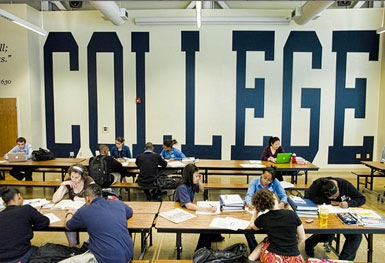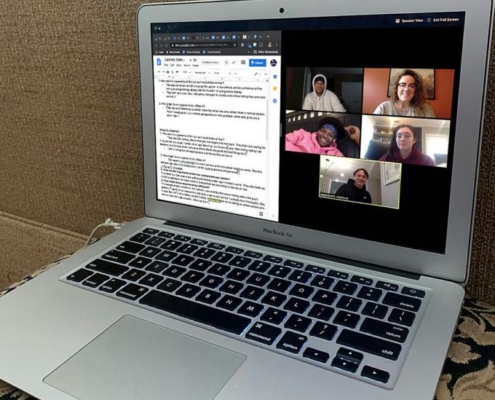
Proving the Viability of a School Choice Voucher
0 Comments
/
In “Proving the Viability of a School Choice Voucher,” author Scott Haller surveyed 107 religiously affiliated private schools across Massachusetts including Catholic, Jewish, Adventist, Baptist, Islamic and Episcopal schools. The report found that an annual voucher of between $6,000 and $8,000 would be sufficient to provide low-income students access to an education in the majority of religiously affiliated Massachusetts K-12 schools.

Modeling Urban Scholarship Vouchers in Massachusetts
Vouchers have the potential to do many things - improve family satisfaction, reduce racial isolation, and strengthen educational outcomes for both the recipients and the children remaining in public schools - all at little or no net cost to taxpayers. The program described in this paper could provide 10,000 students from low-income families with the choices that other families already possess.

Great Teachers Are Not Born, They Are Made: Case Study Evidence from Massachusetts Charters
This report highlights five high-performing charter schools that have assembled and trained highly effective teaching workforces. These include networks include Lowell Collegiate Charter Public School, City on a Hill Charter Public Schools, Advanced Math and Science Academy, the Francis W. Parker Charter Essential School, and Match Charter Public Schools.

Expanding METCO and Closing Achievement Gaps
The paper begins by examining segregation in the United States and in Massachusetts. While schools became more racially balanced in the 1970s, that trend has been reversed in more recent decades. In Massachusetts more than one quarter of African American students and similar numbers of Hispanic students attend heavily segregated schools.

Innovation Interrupted: How the Achievement Gap Act of 2010 Has Redefined Charter Schooling in Massachusetts
Massachusetts charter schools are among the highest performing in the country, as measured by standardized test results. Despite this, the Commonwealth has created a difficult policy environment for growing new and existing charter schools, one that is defined by a statewide cap on the number of charter schools that can exist and a Smart Cap, enacted in 2010, which raised the cap on charter schools in certain underperforming districts.

Meeting the Commonwealth’s Demand: Lifting the Cap on Charter Public Schools in Massachusetts
Charter public schools are one of the few public school choice options available in Massachusetts largely due to restrictions the state constitution imposes on public education spending. Charters outperform traditional public schools; statewide, charter school students gain an additional month and a half of learning in English and two and a half months in math compared to students in traditional public schools.

Giving Kids Credit: Using Scholarship Tax Credits to Increase Educational Opportunity in Massachusetts
While higher-income families have a plethora of K-12 educational options, lower-income families’ options are often limited to the local district school to which they are assigned. This paper proposes a constitutional and fiscally responsible method of expanding educational options for low-income families.

Seeds of Achievement: Appletree’s Early Childhood D.C. Charter Schools
Although early childhood education has been on the federal agenda since the 1960s and President Johnson’s War on Poverty, a renewed focus on the value of high-quality early childhood programming, in the form of President Obama’s Preschool for All initiative, has thrust the issue of universal preschool back into the spotlight.

Matching Students to Excellent Tutors: How a Massachusetts Charter School Bridges Achievement Gaps
The pages that follow describe the history and impact of Match Corps in an attempt to capture this important educational innovation. This paper raises and answers questions about why Match’s tutoring models are so uncommonly effective and what that means for their potential impact on education beyond Match and beyond Boston. Finally, this work ends with recommendations for what policymakers and others should learn from Match, which has changed the lives of many students and stands to impact perceptions of what really makes a difference in schools.

Matching Students to Excellent Teachers: How a Massachusetts Charter School Innovates with Teacher Preparation
Known throughout the Commonwealth and the nation as a network of high-performing charter public schools, Match Education takes a highly specific approach to education reform. Match aims to help students who have been traditionally underserved in the public school system achieve at very high levels, and it does so by taking a structured, ‘No Excuses’ approach to education.

School Vouchers in Washington, DC: Lessons for Massachusetts
"School Vouchers in Washington, DC: Lessons for Massachusetts" was presented by Patrick Wolf in 2013.

School Vouchers in Washington, D.C.: Lessons for Massachusetts
This report tells the story of the Opportunity Scholarship Program, paying special attention to lessons that can be applied to educational improvement in the urban areas of Massachusetts. Section 1 describes the design and initial implementation of the program. Section 2 outlines the main features of the rigorous experimental evaluation of the program’s impacts on participating students and parents. The main results of that evaluation are presented in Section 3. Section 4 concludes by discussing the implications of the OSP results for possible school choice reforms in Massachusetts.

Charter Schools in New Orleans: Lessons for Massachusetts
While the remarkable turnaround in New Orleans was accelerated - and perhaps even made possible - by the very storm that nearly destroyed the city, it still has education experts looking for lessons that might be applied elsewhere. This paper looks at the public school reform efforts of New Orleans following Hurricane Katrina and its impact on student achievement. It also offers recommendations on how urban public schools in Massachusetts, which historically underperforms the commonwealth’s suburban school districts, could benefit from New Orleans’ experience.

A Republic of Republics: How Common Core Undermines State and Local Autonomy over K-12 Education
By signing on to national standards and the assessments that will accompany them, participating states have ceded their autonomy to design and oversee the implementation of their own standards and tests. The implications of ceding this autonomy are varied. Not only do some states risk sacrificing high quality standards for national standards that may be less rigorous, but all states are sacrificing their ability to inform what students learn.

Looking Back to Move Forward: Charter School Authorizing in Massachusetts
Thus 20 years after the charter school movement began in Massachusetts, it is at a crossroads. This paper aims to point the Commonwealth in the right direction by exploring the history of charter school authorizations, with an eye to understanding how the current authorization process both sets Massachusetts apart from other states and stands to constrain the continued success of the charter school movement.

Preserving Charter School Autonomy
Three years ago, with great incentive from the federal government, the Massachusetts state legislature raised the cap on charter schools in some underperforming districts across the Commonwealth. The move was welcomed by parents, students, and other concerned citizens in those communities—communities where charters have provided a high quality alternative to the traditional public system.

“And You Shall Teach Them Diligently”: The History and Status of Jewish Day Schools in Massachusetts
Beginning in the late 1930s, the confluence of a number of social, ideological, religious, and demographic factors led to the rise of Orthodox day schools in Boston and elsewhere. In the ensuing decades, the Jewish community migrated to the Boston suburbs and even further to the west.

Rhode Island Jewish Day Schools and Scholarship Tax Credits
This is the third in a series of Pioneer Institute policy briefs on scholarship tax credit programs. The first, in 2007, was a groundbreaking study of scholarship tax credit programs in Florida, Minnesota, and Arizona. The second report, published in 2010, built on that research in assessing Rhode Island's Corporate Scholarship Tax Credit (CSTC) program, which became law in 2007. That study provided a review of the CSTC program's legislative history, program design and impact and offered recommendations to policymakers based on Rhode Island's experience.

Four Models of Catholic Schooling in Massachusetts
Thought leaders in education, especially in Massachusetts, rarely acknowledge the precedent that Catholic education sets and the model that it has long provided in offering high quality educational options to students of all backgrounds. This could be because many Catholic schools serve poor and minority students with great success, thus revealing the comparatively low quality of too many public schools that do not.

The Serpent in Finland’s Garden of Equity
About four decades ago, Finland introduced major reforms to grades 1-12 and teacher education, with noteworthy results. In 1970, less than 10% of its students graduated from high school. By 2010, most high school-age students attended high school and most of these students graduated.

METCO Merits More
Massachusetts' METCO program (Metropolitan Council for Educational Opportunity) enables about 3,300 students who live in Boston and Springfield to attend opportunity-rich suburban schools. Since the vast majority of the students in METCO are either African American or Latino and most suburban districts remain overwhelmingly white, METCO fulfills two goals: it creates a degree of racial and ethnic diversity and provides students who'd otherwise attend challenged school districts the opportunity to attend schools with reputations for rigor and excellence.

Be Not Afraid: A History of Catholic Schooling in Massachusetts
The overall aim of this policy paper is not only to reveal the urgency of the problem in Catholic education; it also strives to explain why Catholic schools in Massachusetts and in the city of Boston should be considered essential partners in education. It does so by presenting academic data on the successes of Catholic schools in the Archdiocese of Boston and the state and nationwide; it makes comparisons to surrounding public school systems, such as the Boston. Finally, this paper outlines current efforts on the part of the Catholic community and the Archdiocese of Boston especially, to reverse the discouraging trend of Catholic school closures in Boston and beyond. The report concludes by providing recommendations for the perpetuation of Catholic schools in Massachusetts.

Education Tax Credits – A Review of the Rhode Island Program and Assessment of Possibilities in Massachusetts
The first part of this brief presents a detailed description of Rhode Island's Corporate Scholarship Tax Credit (CSTC) program, summarizing the key institutional features of the program. The second part of the brief extracts lessons learned from Rhode Island's tax credit program and assesses the possibility of the adoption of a similar tax credit funded scholarship program in Massachusetts.

The Know-Nothing Amendments: Barriers to School Choice in Massachusetts
This paper will consider a sad phenomenon in American history—19th-century nativism and in particular, anti-Catholic prejudice—and its lingering and deleterious effects on American primary and secondary education.

School Choice Without Vouchers: Expanding Education Options Through Tax Credits
The school choice movement has suffered a number of severe setbacks during the last decade. California and Michigan voters rejected school voucher ballot initiatives in 2000, state courts in Colorado and Florida ruled that their voucher programs were unconstitutional, and during negotiations over the No Child Left Behind Act, President Bush abandoned provisions that would allow students in failing public schools to switch to private schools. Fifteen years after Milwaukee instituted the nation’s first voucher program, fewer than 35,000 non-special education students receive publicly funded school vouchers nationwide.

Transforming Urban School Districts through Choice
The Foundation for Education Reform & Accountability (FERA), based in Albany, New York, has been implementing a school-choice initiative — the Albany Project — that has created high-quality charter schools to serve more than half of the local public school student population in the state's capital city. FERA believes that a district composed of choice schools can better serve students, parents, and the community than the traditional urban school district system. The Albany Project is demonstrating that the charter school model — freedom from state regulations and education bureaucracy, freedom to innovate, and increased accountability—can better serve all students, not just the small segment of the population fortunate enough to win an enrollment lottery or afford a private school.

Parents, Choice, and Some Foundations for Education Reform in Massachusetts
Drawing from a telephone survey of 1,000 public school parents in the ten largest school districts in Massachusetts, this paper critically examines public school parents’ knowledge of and interest in alternative schooling options.

School vouchers and expanded parental choice in education
School vouchers and expanded parental choice in education was provided in October 2000.

Charter Colleges: Balancing Freedom and Accountability
This paper applies the charter school idea to public higher education. It makes the case that deregulation coupled with a charter or agreement with the state will enable institutions to operate more efficiently and will produce higher quality educational results. The argument is based on research comparing highly regulated institutions with more independent colleges across the country, as well as interviews with a number of educational, public policy, and political leaders in Massachusetts. The authors draw on the history of Michigan as well as the more recent experience in New Jersey.

Competition in Education a 1999 Update of School Choice in Massachusetts
This study updates the work done by Armor and Peiser. The author gathered data for two additional years of the interdistrict choice program and similar data for the state’s charter school program as well. This update, for the most part, confirms the demographic findings of the initial study with regard to interdistrict choice. The racial impact on sending districts continues to be negligible. The impact on some of the receiving districts was to increase racial diversity; this positive effect continues and is increasing. Clearly, more minority students are taking advantage of the interdistrict choice program.
